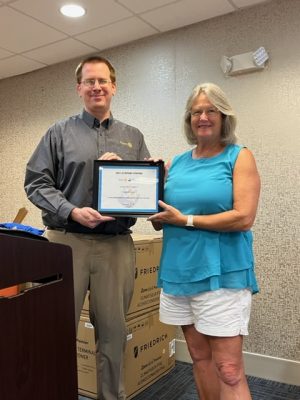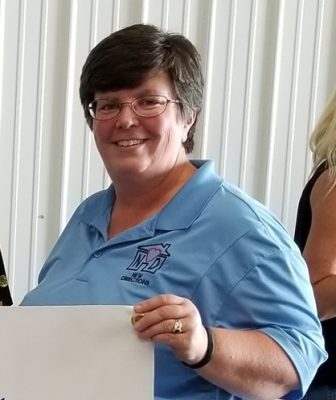Jacksonville School District 117 will be on the cutting edge with school security with a new program later this year.
The Jacksonville School District approved a 4-year contract with Centegix Crisis Alert to implement a comprehensive alert system for any emergency event in the school.
Superintendent Steve Ptacek says he and Jacksonville Police Chief Adam Mefford met over the summer after a number of high profile school shooting incidents occurred at the end of the previous school year. Both men say it really pushed the issue to the forefront to make Jacksonville schools more secure.
Ptacek says he had been looking at a number of cellphone and computer applications that could implement a security alert system into the schools but none of them were quite what he envisioned. Ptacek says a Central Office staff member found Centegix and brought it to him as a proposed option: “It’s a card about the thickness of 3 credit cards, and it would go behind our lanyard ID that we carry around. It has one button on it. All of our staff will have it. You push the button 3 times and it indicates a local emergency, not 9-1-1 and not an active shooter, but a health emergency, a fight, or something like that. Then, the local building level administration, nurse, and people would come running. If they keep pushing the button, I think it’s 8 times consecutively, it sets off and triggers an entire building-wide lock down and issues a 9-1-1 alert.”
The lock down does not lock doors but puts the schools into an immediate emergency situation where students shelter in place or directs them to get away from a certain location based upon a pinpoint in a computer or mobile application accessed by staff.
Ptacek says the emergency lock down alert has many features at a good price point: “Strobe lights go off. It sends a signal to 9-1-1 dispatch, alerts to the building staff, and just everyone would know immediately to respond in the most safe way. We said, ‘Absolutely.’ We looked into [the company] and the price point. It’s kind of shocking, I feel, for all 11 buildings getting this system installed for $155,000 start up costs. That’s well worth it for what it’s going to provide, not just in the worst-case scenario active shooter but for seizures, for a fight, a call for help, who knows what. The fact that it pops up on all of our phones with a map of the school and specifically says where that situation is happening. That’s just amazing.”
Ptacek says that Jacksonville will be the first school in the Midwest to have the system, as the Atlanta, Georgia based company has alert systems installed currently in 80% of schools in the state of Georgia and about 20% of schools in the state of Florida.
Ptacek says there is training and a few things that will have to be worked through before the system is implemented, like alerting kids and staff who are outside of a building, for instance. He says people will still be picking up a phone to make contact with 9-1-1 as a fail safe to the system in case power or Internet are cut to the building. He says some of the older buildings will have to have their audio systems updated eventually to more modern intercoms to integrate it into the system.
Jacksonville Police Chief Adam Mefford says the timing is now to get a system in place to protect staff and students at area schools: “Right after the Uvalde Elementary shooting, [Ptacek and I] met. We were like, ‘It’s now. We need a system like this. We’ve got to take cost out of the equation, because what are our children worth? We have to be prepared for these emergency situations.’ Steve really took the lead in getting several companies to start demonstrating the proposed systems. When it was narrowed down to [Centegix], I was 100% in support of that decision. I support the school district in putting this system in. I think it’s the correct move, the right move, and the time is right for us now. To have a coordinated system that coordinates a school notification, a lock down, and a notification of the police simultaneously is paramount in response times.”
Mefford says to have the ability to call in an emergency at a school staff member’s fingertips is an extraordinary help. Mefford says that the system’s ability to directly pinpoint in a school building where an emergency is taking place along with a map on how to get there helps get first responders to the place they need to be the quickest and gets others away from that location who may be in danger.
Mefford says it will also help with coordinating external calls for lock downs like police chasing a suspect through an area near a school building or a phoned in threat to a school building. He says it will expedite those calls and coordinate them directly to classrooms through the system’s computer and phone apps. Mefford says if an emergency does occur within a school, the system could activate a school-based security command center within the police department to pinpoint and locate information through security camera access about a potential emergency.
To learn more about the Centegix system or hear the full interviews with Ptacek and Mefford, visit our audio archive. Here is a video of what was played before the District 117 School Board on August 24th.










